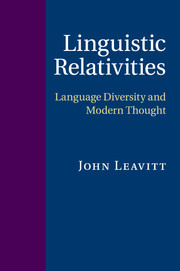Book contents
- Frontmatter
- Contents
- Preface
- Introduction
- 1 A passage to modernity
- 2 One reason, one world, many monads
- 3 The world at war with reason: Britain and France in the eighteenth century
- 4 Multiplicity and the Romantic explosion
- 5 Essences and universals through the nineteenth century
- 6 Boas and the linguistic multiverse
- 7 Linguistic relativity: Sapir, Lee, and Whorf
- 8 The other side of the mirror: a twentieth-century essentialism
- 9 The rise of cognition and the repression of languages
- 10 The return of the repressed
- Conclusion
- Notes
- References
- Index
3 - The world at war with reason: Britain and France in the eighteenth century
Published online by Cambridge University Press: 04 April 2011
- Frontmatter
- Contents
- Preface
- Introduction
- 1 A passage to modernity
- 2 One reason, one world, many monads
- 3 The world at war with reason: Britain and France in the eighteenth century
- 4 Multiplicity and the Romantic explosion
- 5 Essences and universals through the nineteenth century
- 6 Boas and the linguistic multiverse
- 7 Linguistic relativity: Sapir, Lee, and Whorf
- 8 The other side of the mirror: a twentieth-century essentialism
- 9 The rise of cognition and the repression of languages
- 10 The return of the repressed
- Conclusion
- Notes
- References
- Index
Summary
Newton published his Principia in Latin, so it was immediately available on the Continent. Locke made sure a synopsis of his Essay was available in French; a full French translation followed in 1700. Much of the thinking of eighteenth-century France involved the discovery of British thinking or resistance to it. In the view of one French historian of philosophy (Bréhier 1938 [1993]: 275), “The masters of the eighteenth century are Newton and Locke.”
In Britain, conversely, we see the acclimatization and increasing influence of rationalism and of an idealism with Renaissance roots. By mid-century, these together form the main alternative to the still dominant empiricism.
The eighteenth century was marked by intellectual war as much as it was by political revolution.
The word order wars
Word order became a fashionable and most lively issue in France between 1600 and 1800, reaching a climax around 1750. The stylistic consciousness of the age fastened on it as a testing ground for some of its most original ideas, in a unique convergence of grammatical, rhetorical, and logical criteria … Almost everybody thought he had something to add in these debates. Every philosophe was somewht of a grammarian, and every grammarian thought of himself as a metaphysician.
(Scaglione 1972: 222, 254)By the end of the seventeenth century, there was a growing tendency in French philosophy to valorize the bodily part of the Cartesian dichotomy, and with it the complexities of sensation, emotion, and imagination, alongside the rigidity of reason.
- Type
- Chapter
- Information
- Linguistic RelativitiesLanguage Diversity and Modern Thought, pp. 54 - 71Publisher: Cambridge University PressPrint publication year: 2010



